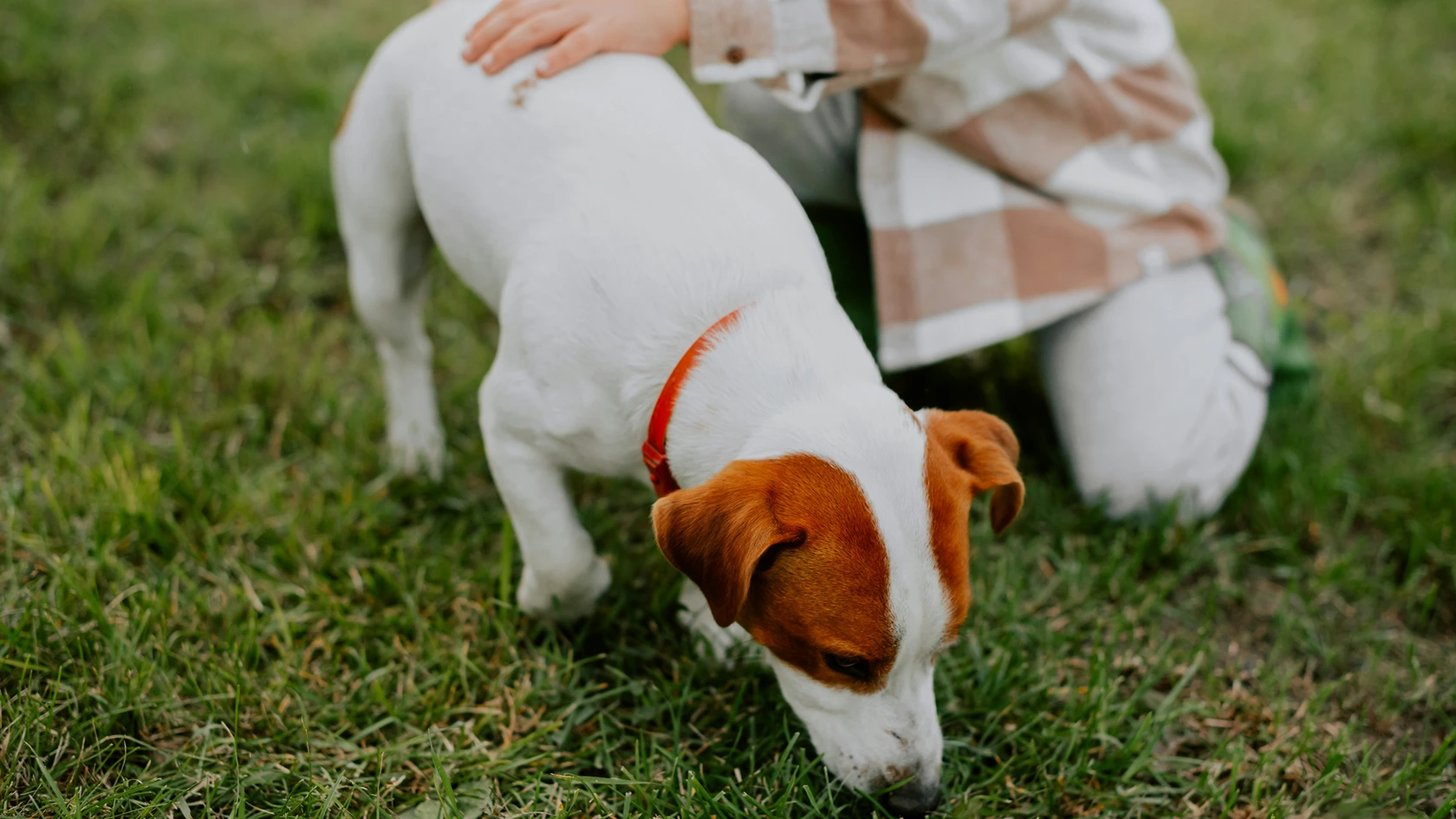TL;DR: What You Need to Know About Dogs Eating Grass
- Natural behaviour: Occasional grass eating is normal for many dogs and can be part of their instincts, enjoyment, or digestive routine.
- Healthy reasons: Dogs may graze for fibre, minor digestive relief, or simply because they like it. It’s often a harmless habit tied to their natural instincts.
- Observe patterns: Dogs usually eat grass in line with their routines, mealtimes, or seasonal changes—spring and early summer provide more opportunities for grazing.
- When to watch: Sudden increases in grass eating, frequent vomiting, lethargy, blood in vomit/stool, appetite changes, or unexplained weight shifts may indicate health issues.
- Positive management: Training, increasing exercise, providing puzzle toys, adjusting meals, adding fibre, engaging in new activities, and limiting grass access help keep your dog safe and happy.
- Peace of mind: Most grass eating is fine, but staying observant ensures your dog’s habits are healthy.
Have questions? Our team is happy to guide you on your dog’s health, habits, and overall well-being—let’s make sure your dog stays happy and safe!
Is your dog regularly eating grass, leaving you wondering about this peculiar behaviour? This is a common behaviour owners notice in their pets. Some dogs just nibble on grass here and there, while others consume it like it’s their favourite snack. It can make you wonder if they are bored, following some instinct, or maybe feeling sick. Most of the time, it’s nothing to worry about, but the reasons can be different—sometimes it’s about diet, other times it’s more emotional.
Paying attention to these habits can help you tell when it’s just a quirky, normal thing and when it might be a sign of something that needs a vet’s attention. In this blog, we’ll break down why dogs eat grass, the most common reasons behind it, and what it could mean for your dog’s overall health and wellbeing.
Understanding Your Dog's Grass Eating Habit
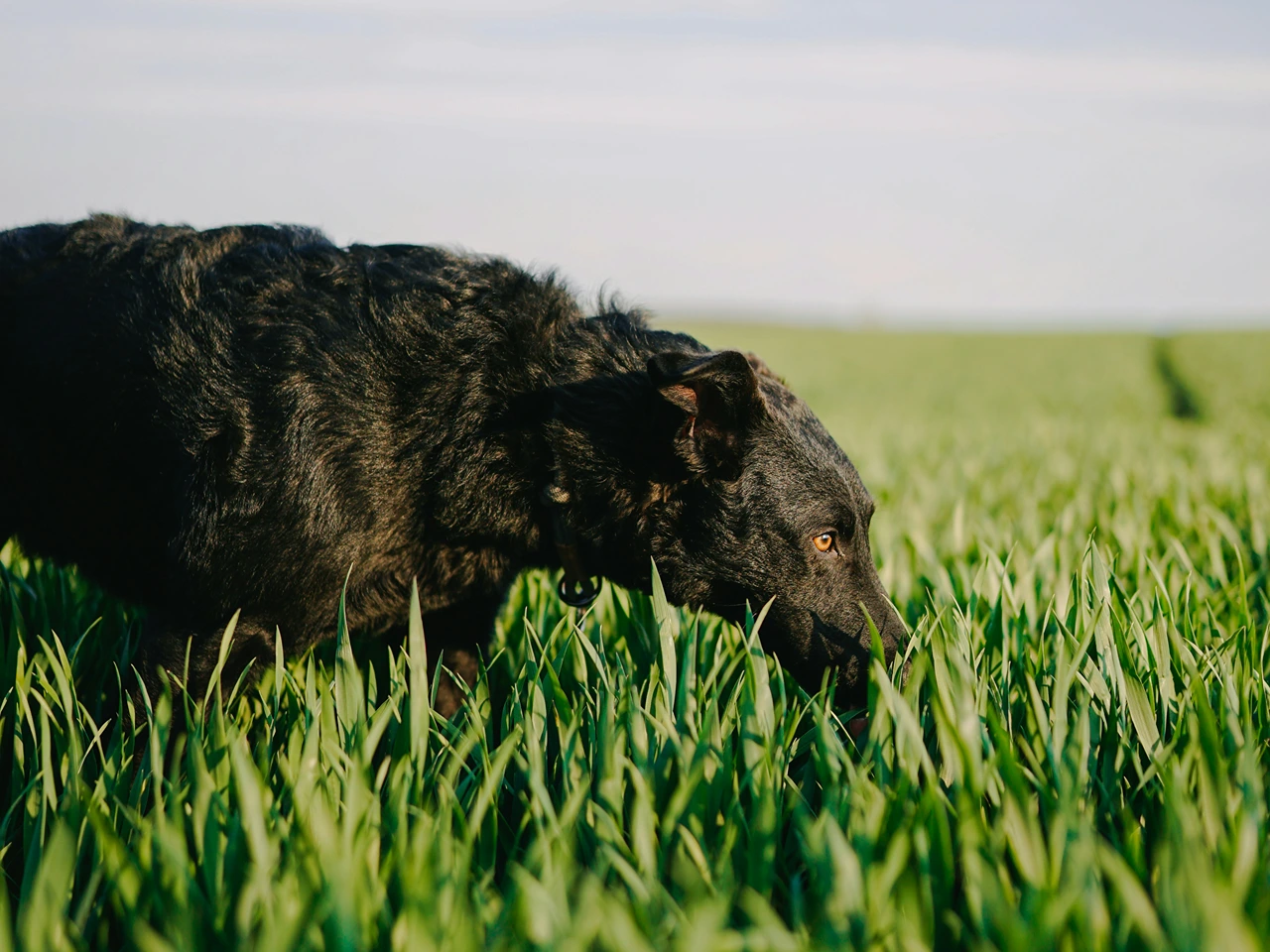
Dogs often eat grass in different patterns and at varying frequencies, and these habits can tell you a lot about their behaviour. When observing your pet, it’s important to notice whether it’s just casual grazing or a sign of urgent consumption.
Many dogs will eat grass casually during their morning walks, while others may show more interest in the evening. Research shows that dogs usually have their own patterns when it comes to grass eating, and sometimes it even lines up with their mealtimes or daily routines.
Dogs instinctively choose the type of grass they want, which can include:
- Fresh lawn grass
- Wild weeds
- Tall grass patches
- Seasonal growth
Grass eating also tends to increase during spring and early summer, when dogs enjoy being outside more. This seasonal change gives them more opportunities to graze, and many dogs will naturally take advantage of the fresh, growing grass.
Common Reasons Why Dogs Eat Grass
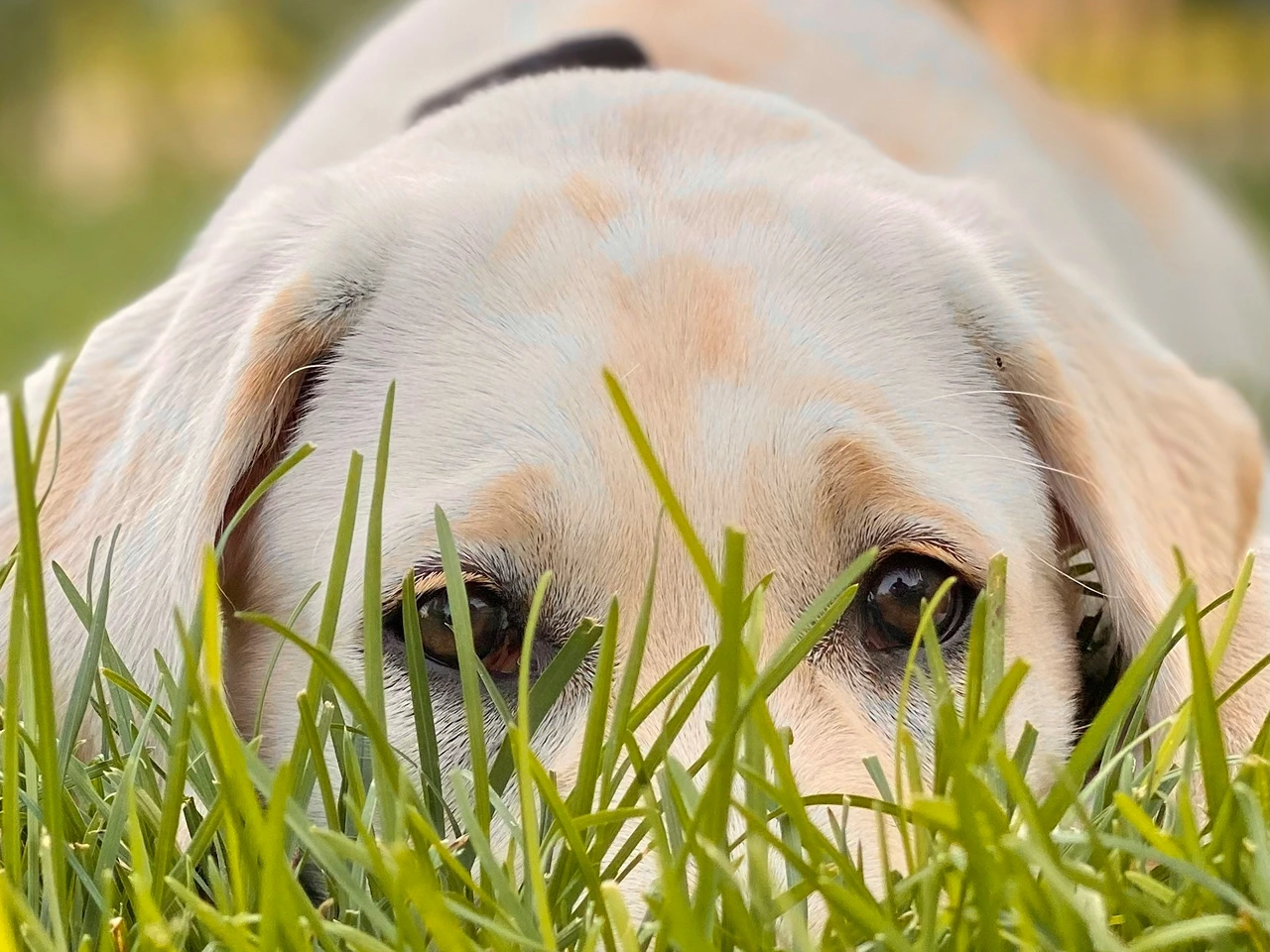
Dogs may eat grass for a variety of reasons, and while some may seem odd, most are tied to natural instincts or simple everyday needs.
1. Instinctive Scavenging Behaviour
It has been observed in wild dogs that munching on plants was a way to get extra nutrients. Your dog may find the familiar habit of eating grass to be part of that same survival instinct. Even though modern dog food provides complete nutrition, this behaviour in dogs still lingers.
2. Natural Fibre Boost
Sometimes, grass can help with digestion because grass contains natural fibre. Dogs seem to consume grass when they need help moving food through their system. Eating grass may provide relief from minor symptoms of stomach upset, especially if they’ve eaten too much or too quickly.
3. Self-Induced Vomiting
Another reason is that dogs eat grass to induce vomiting when they feel unwell. If your dog has eaten grass and vomits after, it might be their way of relieving an upset stomach. While not all dogs vomit after eating grass, it’s a behaviour often seen when they feel bloated or uncomfortable.
4. Nutritional Deficiencies
Sometimes, dogs may eat grass because they’re missing certain nutrients. Eating grass but also going after other non-food items could be a sign their diet isn’t giving them everything they need. While it is unlikely that dogs eat grass purely for nutrients, grass can provide trace minerals that might be missing.
5. Psychological Triggers
If your dog is bored, stressed, or anxious, they may turn to grass out of boredom. This is especially common in younger dogs, as dogs show obsessive behaviours when left alone for long periods.
6. Simple Enjoyment
Not every case is tied to health. Some dogs seem to enjoy the taste of grass or the texture of a fresh patch of grass. Just like some people snack for pleasure, dogs sometimes eat grass simply because they like it.
7. Digestive Discomfort
When a dog is munching on a lot of grass, it might be their way of easing bloating or discomfort. Often, it gives them short-term relief from minor digestive problems.
When to Consult a Vet About Grass Eating
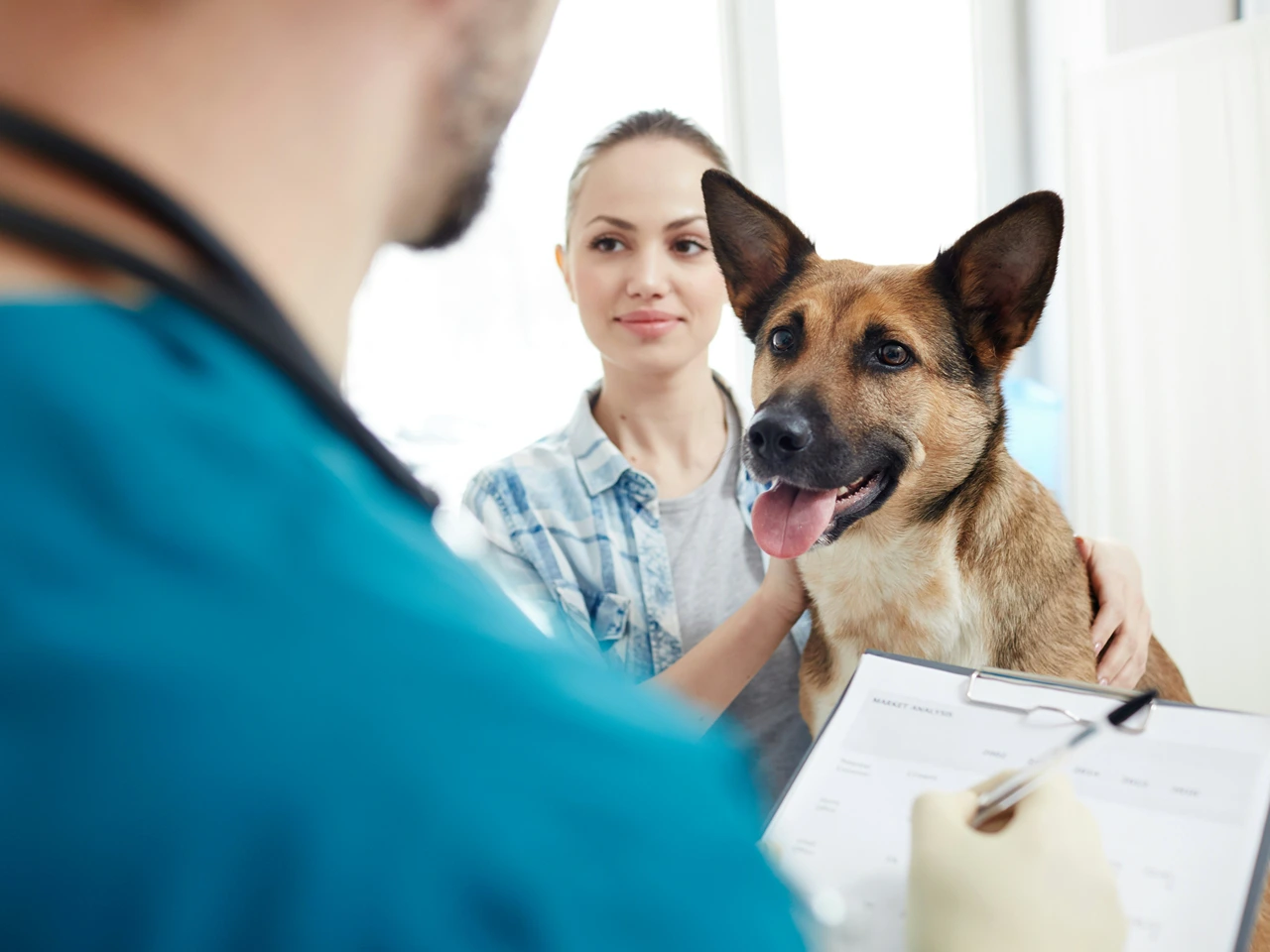
Most of the time, eating grass is generally harmless, but sometimes it can hint at something more serious. If you spot any of the signs below, it’s a good idea to check in with your vet or even head to an animal hospital for advice.
- Sudden increase in grass consumption: If your dog has been eating large amounts of grass all of a sudden, it may point to an underlying issue that requires attention.
- Gastrointestinal distress: Dogs do vomit occasionally, but if eating grass is always followed by frequent vomiting, it could mean your pet is struggling with digestive problems.
- Lethargy or depression: When dogs appear low in energy or unusually withdrawn after grazing, it may indicate that eating grass is connected to a bigger health concern.
- Blood in vomit or stool: Seeing blood after your dog eats grass and vomits is a serious warning sign and shouldn’t be ignored.
- Changes in appetite or water intake: When a dog starts to eat grass to make up for refusing normal meals or drinking less water, it’s a sign you should consult a vet.
- Unexplained weight changes: If your dog suddenly gains or loses weight, especially alongside increased grass eating, it could point to illness.
- Diarrhea or constipation: If your dog becomes sick after eating grass and develops diarrhea or constipation, this goes beyond a harmless grazing habit.
Also, be cautious about the environment. Fertilizers on the grass or pesticides can make your dog sick, even if the grazing itself isn’t the problem.
How Do You Stop Your Dog From Eating Grass
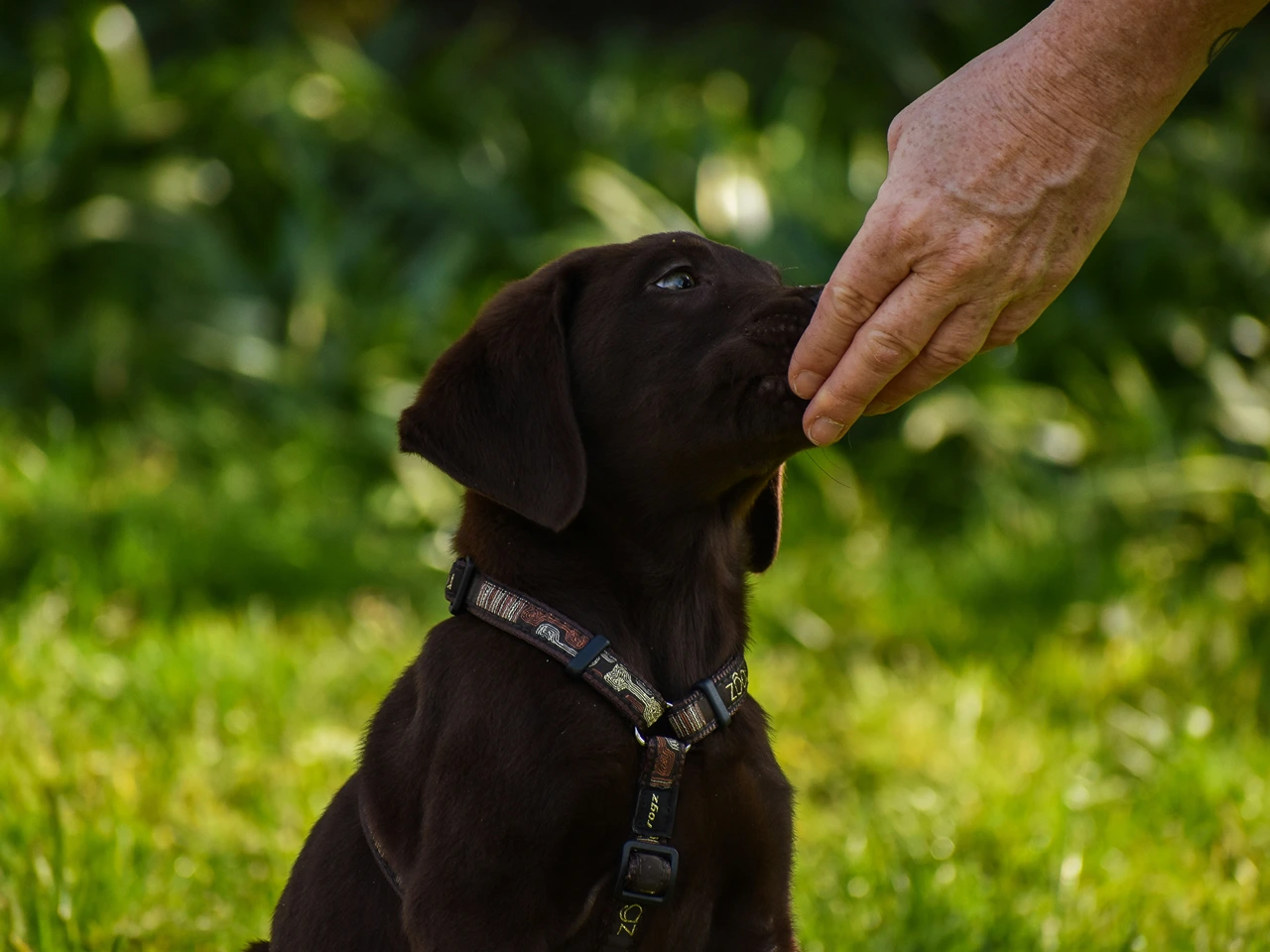
If you want to stop your dog from eating grass, there are several safe and effective ways to redirect the behaviour. The goal is to guide your pet without causing stress or frustration.
Train with "Leave It" Command
Teaching your dog to respond to “leave it” helps control what they put in their mouth. With consistent practice, you can prevent them from eating grass in unsafe areas or reduce how much they munch.
Increase Physical Exercise
A lot of dogs eat grass out of boredom. Giving them more walks, playtime, or a good game of fetch can burn off that extra energy and make them less likely to start grazing.
Provide Puzzle Toys
When dogs feel restless, interactive puzzle toys keep their minds busy. This kind of mental stimulation is a healthy alternative to chewing on grass and plants when they’re idle.
Adjust Meals
At times, dogs eat grass to help with digestion. Offering smaller, more frequent meals or adjusting food portions can keep their stomachs settled and reduce the need to graze.
Add Fibre-Rich Foods
If your pup seems to eat grass to relieve digestive discomfort, introducing safe, fibre-rich foods into their diet is a healthier solution than relying on grass and plants.
Introduce New Activities
Engaging your dog in new games, training exercises, or social play can redirect their attention and reduce the habit of grazing just to pass time.
Limit Grass Access
If your dog keeps going after the same spot in the yard, try blocking it off. It helps break the habit and keeps them safe from fertilizers or chemicals that might be on the grass.
Final Thoughts
Dogs eating grass might look a little strange, but most of the time it’s totally normal and nothing to stress about. Sometimes they do it to help with digestion, sometimes out of boredom, and other times just because they like it. But it’s still worth keeping an eye on—occasional grazing is usually no big deal, but if you notice sudden changes, lots of vomiting, or other signs of sickness, that’s when it’s time to take it seriously.
As a dog owner, your job is to stay observant and proactive, making sure your pet’s habits don’t hide something more serious. When in doubt, consult your vet.
Frequently Asked Questions
Why does my dog eat grass?
Dogs eat grass for several different reasons, most of which are completely natural.
Instinctive Roots: One of the common reasons why your dog may nibble on grass comes from survival instincts passed down from wild ancestors.
Digestive Aid: Many dogs that eat grass do so to get a little extra fibre, which helps with smoother digestion.
Upset Stomach Relief: Some pups will eat grass to vomit when they’re feeling nauseous, using it as a way to clear their stomach.
Bored Behaviour: Occasionally, dogs chew on grass because they are bored, especially if they’re under-stimulated.
Personal Preference: A few dogs simply like eating grass, enjoying the taste or texture, the same way people snack.
Is eating grass normal for dogs?
Yes, eating grass is a common behaviour, but the reasons and patterns can vary.
Seasonal Trend: Grass eating usually happens more in spring and summer, especially when fresh new growth starts popping up.
Grazing Habits: Some dogs will frequently eat grass, making it part of their routine without any real harm.
Outdoor Impact: It’s also noted that grass eating increases when dogs spend more time outside and have easy access to lawns or fields.
Excessive Warning: Watch for signs of eating grass excessively, as this could indicate digestive upset or anxiety.
Mild Benefit: In moderation, grass is a good occasional addition since it can provide trace fibre and minerals.
Should I be worried if my dog is eating grass?
Usually, no—but certain signs should make you pay closer attention.
Vomiting Concern: If your dog is eating grass and vomiting every time, it might point to a digestive problem.
Additional Red Flags: Be cautious if your pet eats grass and has other symptoms such as lethargy, diarrhea, or appetite loss.
Prior Illness: An illness prior to eating grass could explain why your dog suddenly developed the habit.
Persistent Grazing: Be alert, especially if your dog keeps returning to the same patches or seems obsessed.
Potential Health Risks: In rare situations, dogs can suffer from hidden conditions that only a vet can diagnose.
How can I stop my dog from eating grass?
If you want to stop your dog from eating grass, there are safe and effective ways to manage it.
Training Commands: A firm “leave it” helps them to stop eating grass in the moment and prevent risky grazing.
Extra Stimulation: Providing more play and puzzles can help since some dogs eat grass just for entertainment.
Dietary Support: Adjust meals or add fibre so your dog doesn’t resort to munching on grass for digestion.
Environmental Safety: Always avoid areas with grass that has been treated, since chemicals can be harmful.
Vet Consultation: If you’re concerned that your dog is eating grass too often, consulting a vet is always a safe step.
Can eating grass harm my dog?
Most of the time, grazing is harmless, but there are risks you should watch out for.
Safe Snacking: A little grass your dog finds naturally growing and untreated is usually fine.
Toxic Danger: Be cautious of grass that has been treated with pesticides or fertilizers, as it can make dogs sick.
Diet Issues: If your dog prefers grass over food, it could point to nutritional gaps.
Frequent Grazing: Dogs that frequently eat grass need monitoring for changes in appetite or digestion.
Excessive Habits: If you see signs of excessive grass eating, it’s smart to check if something more serious is going on.

